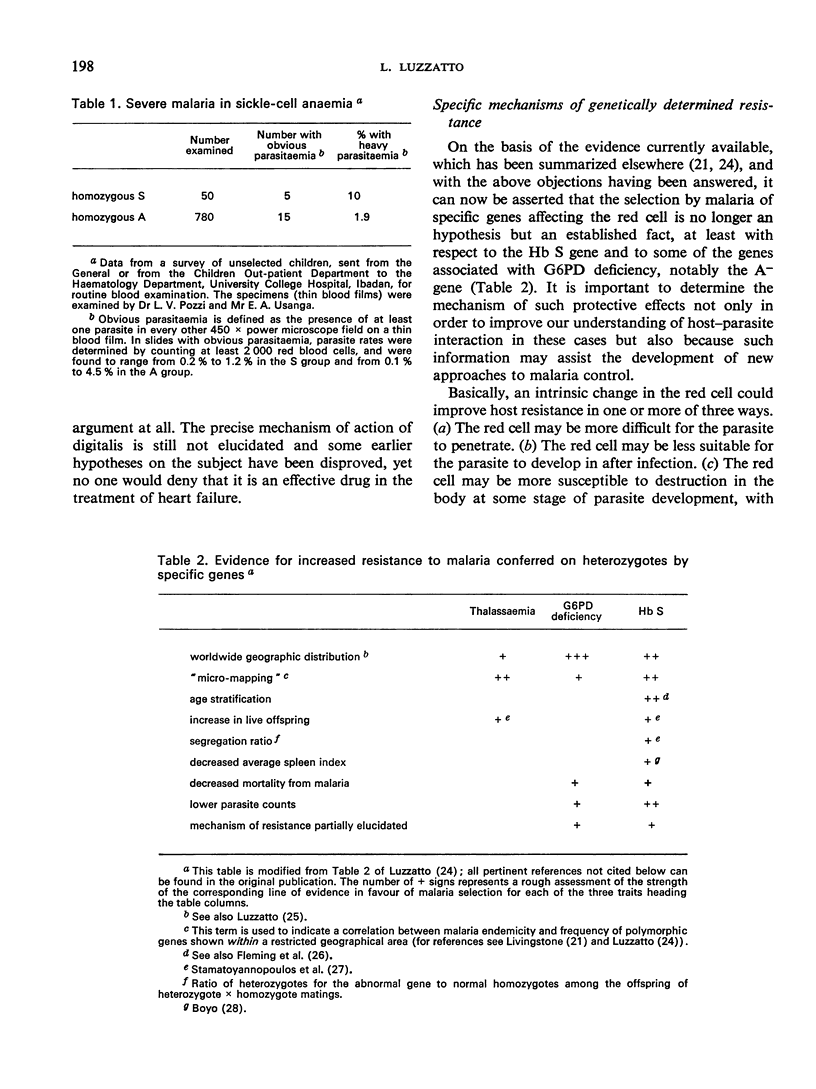Abstract
Some of the available information on the genetics of Plasmodium is reviewed, and some of its peculiarities are emphasized. Genetic factors in the human host that may affect susceptibility to malaria are critically evaluated. Most of the studies thus far have been concerned with the genetics of host erythrocytes but there is recent evidence that genes affecting immune processes may also be involved. At least two genes affecting red cells confer relative resistance to P. falciparum: the autosomal gene for haemoglobin S (Hb S) and the sex-linked gene for the glucose-6-phosphate dehydrogenase (G6PD) variant known as A-. Whereas malaria selection can be regarded as established for these genes, it still remains a hypothesis for some other polymorphic traits of red cells. Differential susceptibility to P. falciparum of red cells with different genotypes has been tested by in vitro cultures, in which the invasion of new cells and intracellular development of the parasite can be followed by parasite counts and by 14C-isoleucine uptake. A model that relates genetic factors in Plasmodium and in man and that may account for certain features of host—parasite interactions is presented.
Full text
PDF







Selected References
These references are in PubMed. This may not be the complete list of references from this article.
- Adeloye A., Luzzatto L., Edington G. M. Severe malarial infection in a patient with sickle-cell anaemia. Br Med J. 1971 May 22;2(5759):445–446. doi: 10.1136/bmj.2.5759.445. [DOI] [PMC free article] [PubMed] [Google Scholar]
- BANO L. A cytological study of the early oocysts of seven species of Plasmodium and the occurrence of post-zygotic meiosis. Parasitology. 1959 Nov;49:559–585. doi: 10.1017/s0031182000027104. [DOI] [PubMed] [Google Scholar]
- BISHOP A. Problems concerned with gametogenesis in Haemosporidiidea, with particular reference to the genus Plasmodium. Parasitology. 1955 May;45(1-2):163–185. doi: 10.1017/s0031182000027542. [DOI] [PubMed] [Google Scholar]
- Bienzle U., Ayeni O., Lucas A. O., Luzzatto L. Glucose-6-phosphate dehydrogenase and malaria. Greater resistance of females heterozygous for enzyme deficiency and of males with non-deficient variant. Lancet. 1972 Jan 15;1(7742):107–110. doi: 10.1016/s0140-6736(72)90676-9. [DOI] [PubMed] [Google Scholar]
- Canning E. U., Sinden R. E. The organization of the ookinete and observations on nuclear division in oocysts of Plasmodium berghei. Parasitology. 1973 Aug;67(1):29–40. doi: 10.1017/s0031182000046266. [DOI] [PubMed] [Google Scholar]
- Carter R. Enzyme variation in Plasmodium berghei and Plasmodium vinckei. Parasitology. 1973 Apr;66(2):297–307. doi: 10.1017/s0031182000045236. [DOI] [PubMed] [Google Scholar]
- Ferone R., O'Shea M., Yoeli M. Altered dihydrofolate reductase associated with drug-resistance transfer between rodent plasmodia. Science. 1970 Feb 27;167(3922):1263–1264. doi: 10.1126/science.167.3922.1263. [DOI] [PubMed] [Google Scholar]
- Luzzatto L., Usanga F. A., Reddy S. Glucose-6-phosphate dehydrogenase deficient red cells: resistance to infection by malarial parasites. Science. 1969 May 16;164(3881):839–842. doi: 10.1126/science.164.3881.839. [DOI] [PubMed] [Google Scholar]
- Oxbrow A. I. Strain specific immunity to Plasmodium berghei: a new genetic marker. Parasitology. 1973 Aug;67(1):17–27. doi: 10.1017/s0031182000046254. [DOI] [PubMed] [Google Scholar]
- RAWNSLEY H. M., YONAN V. L., REINHOLD J. G. Serum protein concentrations in the North American Negroid. Science. 1956 Jun 1;123(3205):991–992. doi: 10.1126/science.123.3205.991. [DOI] [PubMed] [Google Scholar]
- Theakston R. D., Fletcher K. A. An electron cytochemical study of glucose-6-phosphate dehydrogenase activity in erythrocytes of malaria-infected mice, monkeys and chickens. Life Sci II. 1971 Jun 22;10(12):701–711. doi: 10.1016/0024-3205(71)90153-6. [DOI] [PubMed] [Google Scholar]
- Tokuyasu K., Ilan J., Ilan J. Biogenesis of ribosomes in Plasmodium berghei. Mil Med. 1969 Sep;134(10):1032–1038. [PubMed] [Google Scholar]
- Walliker D., Carter R., Morgan S. Genetic recombination in Plasmodium berghei. Parasitology. 1973 Apr;66(2):309–320. doi: 10.1017/s0031182000045248. [DOI] [PubMed] [Google Scholar]
- Yoeli M., Upmanis R. S., Most H. Drug-resistance transfer among rodent plasmodia. 1. Acquisition of resistance to pyrimethamine by a drug-sensitive strain of Plasmodium berghei in the course of its concomitant development with a pyrimethamine-resistant P. vinckei strain. Parasitology. 1969 May;59(2):429–447. [PubMed] [Google Scholar]


